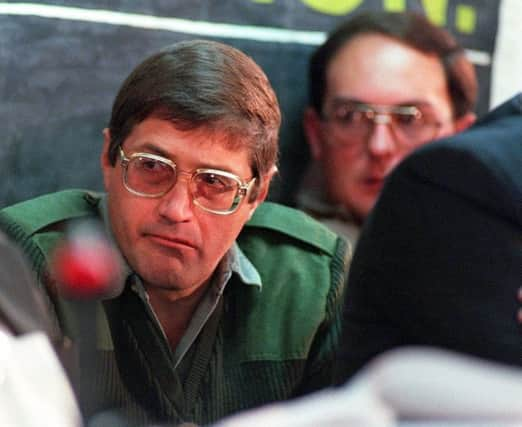Apartheid death squad chief freed after 19 years


Eugene de Kock was nicknamed “Prime Evil” for his role in the killing and torture of activists fighting white minority rule in the 1980s and early 1990s.
South Africa’s justice minister, Michael Masutha, said the move was in the interests of national reconciliation. But those who knew de Kock’s victims were struggling to accept his release.
Advertisement
Hide AdAdvertisement
Hide AdEddie Makue, who worked for the South African Council of Churches when de Kock bombed its headquarters in 1988, injuring 19 people, was ambivalent. He said: “It’s mixed feelings – something we’ve gotten used to as South Africans.”
Mr Makue, now a member of South Africa’s parliament, said he accepted Mr Masutha’s reasons for granting de Kock parole but struggled to accept the harm that he and his unit had inflicted on their prisoners.
“We have seen what devastation it has caused and we find it difficult to understand that he got off,” he said, adding that his faith compelled him to believe that de Kock had changed.
De Kock was arrested in 1994, when apartheid ended, and in 1996 was sentenced to two life terms and an additional 212 years in prison.
During his testimony to the country’s Truth and Reconciliation Commission (TRC), which recommended amnesty to those who admitted to wrongdoing during apartheid, de Kock recalled how he and the C10 police unit tortured and killed anti-apartheid activists at Vlakplaas, a farm outside Pretoria, South Africa’s capital. He was granted amnesty for most offences but the commission had the power to grant amnesty only to human rights violators whose crimes were linked to a political motive and who made a full confession.
During the TRC hearings, he described the murders of a number of African National Congress members, in countries including Lesotho, Swaziland, Zimbabwe and Angola, naming the police commander above him in each case.
Sandra Mama, widow of Glenack Mama, who was killed by De Kock in 1992, said she thought the minister was right in granting parole. She added: “He got the instructions from the top and they got away with it. They’re living, you know – they’re amongst us today and one man is taking the fall.”
Mr Masutha said: “In the interest of nation building and reconciliation, I have decided to place Mr de Kock on parole.”
The time and place of his release will not be made public.
Advertisement
Hide AdAdvertisement
Hide AdHowever, Mr Masutha refused medical parole to Clive Derby-Lewis, the man who planned the assassination of anti-apartheid activist and South African Communist Party leader, Chris Hani.
Derby-Lewis, who has cancer, was sentenced to life, along with Polish immigrant Janusz Walus, for the 1993 shooting. Mr Masutha said Derby-Lewis had not shown remorse.
Last year, Mr Masutha declined de Kock’s parole appeal, saying the families of his victims had not been consulted.
Whilst in prison, de Kock did a radio interview in 2007, accusing South Africa’s last white ruler, FW de Klerk, of having hands “soaked in blood” for ordering specific killings.
The former president denied the allegations, saying his conscience was clear.
During his time in prison, de Kock made contact with some of his victims’ families, asking for forgiveness. Mr Masutha said de Kock had helped the authorities to trace activists who went missing during apartheid.
Mr Makue, who helped some of the young activists targeted by de Kock, believes the former police colonel “has not told the whole truth yet”.